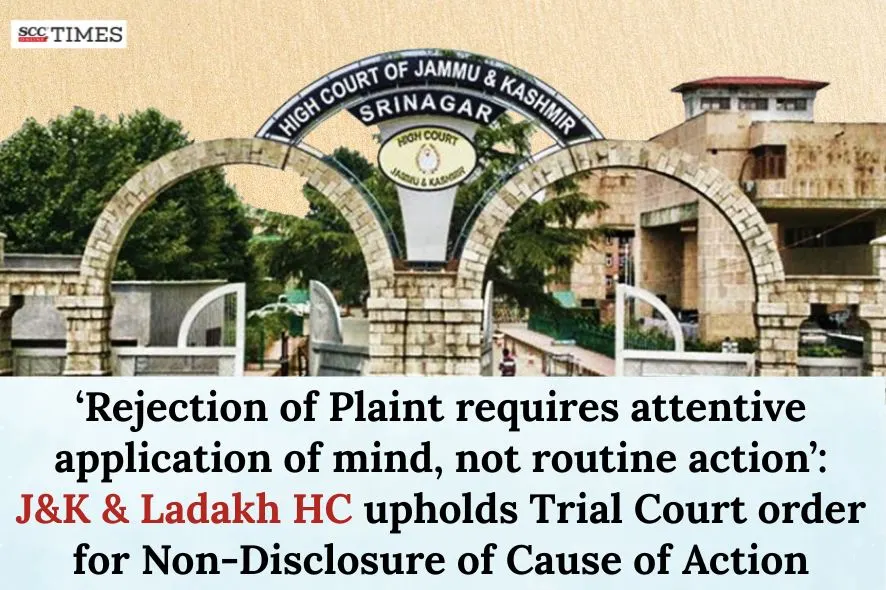Jammu & Kashmir and Ladakh HC: In an appeal filed by the appellant (originally ‘plaintiff’), he had challenged the Trial Court’s order rejecting the plaint at the threshold under Order VII Rule 11 of the Civil Procedure Code, 1908 (‘CPC’), when he had instituted a suit for declaration concerning a residential property. A Single Judge Bench of Rahul Bharti, J., upheld the Trial Court’s decision, concluding that the plaint failed to establish the plaintiff’s right to sue for the reliefs claimed as it did not mention the facts giving rise to the cause of action and as to how the plaintiff was to be reckoned as a claimant.
Background:
The dispute arose over a house located at Talab Tillo, Jammu. The plaintiff filed a suit for declaration and had named four persons as contesting defendants and two persons as proforma defendants. He challenged several documents including gift deeds and powers of attorney. The suit also sought mandatory injunction directing Defendant 4 to restore the possession to the plaintiff and to transfer the title in the plaintiff’s name as wished by the proforma defendants.
The Trial Court, by an order dated 02-08-2021, rejected the suit invoking Order VII Rule 11 CPC, stating that the plaintiff did not plead and show as to how the suit property was legally related to him so as to earn him a right to sue for seeking declaration and reliefs therewith.
Analysis and Decision:
The Court examined the plaint to determine whether the plaintiff had the legal status quo the suit property to earn a right to sue with respect to the documents being assailed in the suit and thereby seek restoration of possession from Defendant 4. The Court noted that the plaint did not mention how the plaintiff was to be reckoned as the owner or claimant of the suit property. Instead, he relied on purported connections of the property to his father and deceased uncle.
The Court relied on Raj Narain Sarin v. Laxmi Devi, (2002) 10 SCC 501, wherein the Supreme Court held that the Civil Courts should be hesitant to exercise jurisdiction under Order VII Rule 11 CPC unless the factual score warrants such an exercise and the matter in issue falls within the four corners of the requirement of the statute and for this, necessary averments in the plaint ought to be considered.
The Court opined that if a plaint is missing the facts constituting a cause of action, it is liable to be rejected either on the Court’s own indulgence or on asking of a defendant. However, if the facts put up in the plaint are introducing a cause of action, then a Civil Court has no discretion to reject such a plaint by borrowing outside reference from the defendant’s end to discredit the plaint and the factual averments made in the written statement.
The Court opined that rejection of a plaint in terms of Order VII Rule 11 CPC is a matter of very attentive application of mind rather than routine following of motion on the part of a Civil Court. The essence of institution of a civil suit is seeking a decree by a plaintiff aiming for conclusive determination of the rights of the parties and such conclusive determination can take place only when a suit is to get its adjudication on the issues of fact and law framed in a civil suit and not before that. The Court observed that the rejection of a plaint is a sort of digression of that nature of adjudication of a civil suit, and such a digression is not to be served to a civil suit unless and until a plaint is self-inviting the same for its rejection.
The Court also relied on Dahiben v. Arvindbhai Kalyanji Bhanusali, (2020) 7 SCC 366, wherein the Supreme Court held that Order VII Rule 11 CPC is an independent and special remedy empowering Courts to summarily dismiss suits at the threshold without proceeding to record evidence and conducting a trial, if it is satisfied that the action should be terminated on any of the grounds contained in the said rule.
The Court further opined that the essence of an application under Order VII Rule 11 CPC to terminate a civil action or to put an end to a litigation is an essential duty of a Civil Court so that further judicial time is not invested wastefully. However, this power is of an abortive nature vis-à-vis a civil suit and is reckoned to be a drastic power for which the conditions envisaged in the said provision are required to be strictly adhered to in case of non-disclosure of a cause of action. Based on the above analysis, the Court agreed with the Trial Court’s order whereby it had rejected the suit, and consequently dismissed the present appeal.
[Sunil Singh v. Krishan Lal Gupta, 2025 SCC OnLine J&K 1092, decided on 08-11-2025]
Advocates who appeared in this case:
For the Plaintiff: Arvind Bandral, Advocate.
For the Defendants: Kuldeep Singh Parihar, Advocate.


